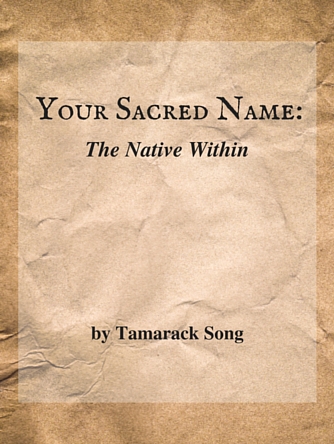Description
Author: Tamarack Song
Offered in both a paper and electronic form (PDF). Photo is not an actual representation of the booklet.
Chapter 1 Journey to a Name
Chapter 2 A Name’s Voice
Chapter 3 Walking with Your Name
Ordering Options
- ONLINE: We accept Visa, MasterCard, Discover, American Express, and eChecks through PayPal.
- BY MAIL: Mail us your order – we accept Visa, MasterCard, checks and money orders. Click here for a mail order form
- INTERNATIONAL ORDERS: Please contact us before ordering to calculate additional postage.
- ORDER A DIGITAL COPY: See the link below.
Purchase and download the booklet: 
Excerpt…
Our Name is our banner. It travels before us and lingers after us; it serves as both our introduction and our legacy. For a Native Person it can signify her special relationship with the Greater Circle or with a particular Relation. Sometimes a Name reflects a Person’s culture, Dodem, or Dreamgift.
Receiving a Name often marks a Rite of Passage — the ritual commemoration and empowering of major transitions on one’s personal Hoop of Life. This may occur at Birth, Dreamquest, Marriage, becoming a Guide or Elder, or occasionally even at one’s Passing Over (Death). A Native may have several different Names in the span of her life, each of which reflect the transformations undergone while walking the Hoop.
A Newborn might be given a Name suggested by events surrounding her birth, or the Parents could Petition an Elder to Fast or Dream for a Name. There is no reason to be in a hurry for a Name — it is common for a Baby to go several Moons, or even a turn of the seasons, before receiving her Name. It is important to allow a Name to come in its own time and way. Sometimes the Baby expresses her own Name, and needs this time to do it.
The Civilized norm is for Parents to choose a Name for their Baby that they like. Other than gender, the Name usually has little to do with the Child. The Name is often a reflection of the Parents’ ego, rather than an Honoring of the uniqueness of the Child. The naming of a Child in this way is a sad reflection of the controlled environment in which the Child will likely be raised.
A Child’s Name is usually considered a temporary one, to be used until her Lifename manifests itself. A Lifename is considered to be sacred, because it is the embodiment of the individual. It reflects, and it answers for others, the question “Who am I?”




